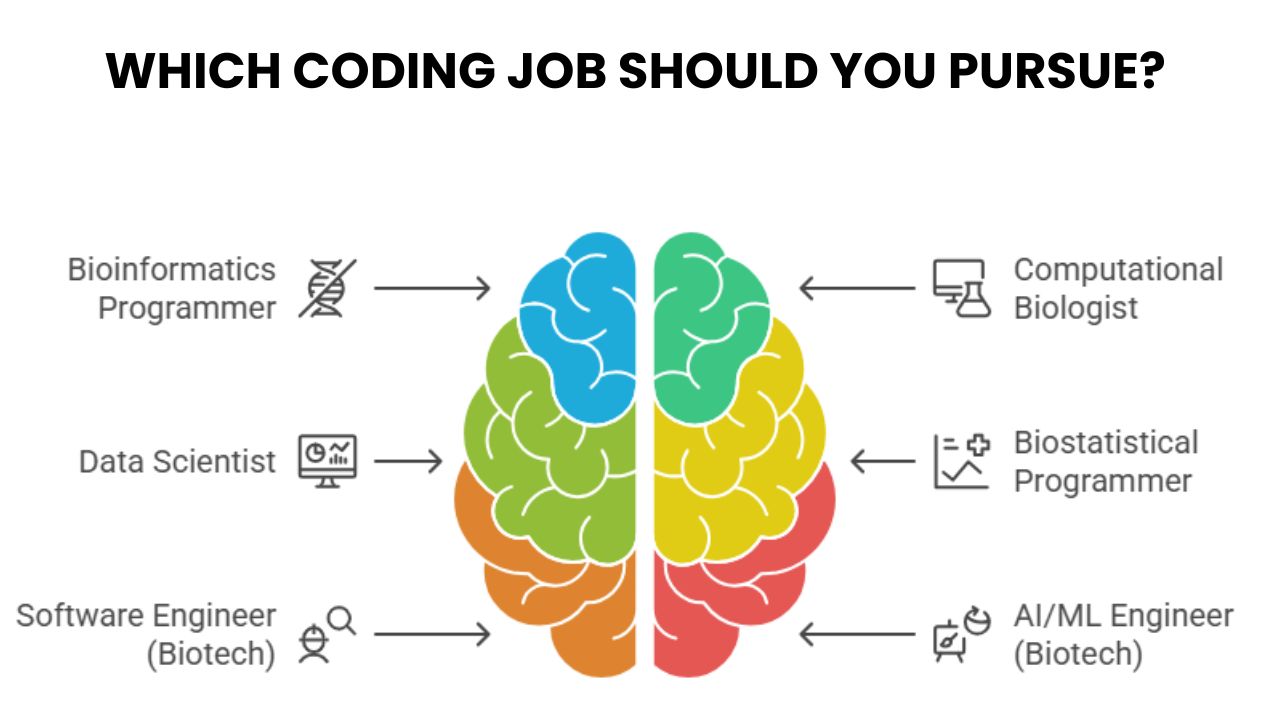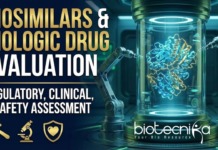Top High-Demand Coding Jobs in Biotech You Should Know
Do You Know that by 2035, over 60% of biotech job roles will require coding and data skills?
Yes, biotech is becoming more than just petri dishes and microscopes. From decoding the human genome to accelerating drug discovery, biotech companies are looking for professionals who can integrate biological knowledge with coding skills. And this is why coding jobs are expanding faster than ever.
Coding in biotech is not just about numbers and algorithms; it’s about solving bigger scientific problems. Imagine predicting drug compounds that will work even before they enter the lab and analyzing millions of genetic sequences to find patterns that could save lives. These are the skills that employers look for, and it’s now time to answer your “Is it worth learning Python?” question.
Here is the thing: not every biotech role requires coding, and not every coder can succeed in biotech. This article will tell you where coding truly makes an impact and what employers are actually looking for. Several coding jobs in biotech allow freshers to explore. As you reach the end, you will be able to get a clear roadmap to launch or develop your career.
Coding Jobs vs Non-Coding Jobs
Biotech offers both coding and non-coding roles. Coding jobs in Biotech focus on handling big data sets, building databases, and working with algorithms. While non-coding roles involve lab work and experiments. Coding is becoming a game-changer, but both roles go hand-in-hand and are important.
|
Coding Jobs |
Non-Coding Jobs |
|
Bioinformatics Programmer |
Lab Technician |
|
Computational Biologist |
Research Associate |
|
Data Scientist |
Clinical Trial Coordinator |
|
Biostatistical Programmer |
Quality Control Analyst |
Now, let’s dive deeper into coding jobs and see where these skills are most crucial.
High-Demand Coding Jobs in Biotech
There are diverse career paths in coding, and if you’ve ever wondered what kind of biotech careers let you apply both your coding and scientific skills, this is where it gets exciting. These high-demand coding jobs in biotech offer some of the most exciting career paths for freshers and experienced professionals.
1. Bioinformatics Programmer
Imagine you are handed a massive dataset of DNA sequences, millions of lines that look like random letters (A, T, G, C). A Bioinformatics Programmer turns that complex content into clear data. They write scripts in Python or R to clean, analyze, and visualize biological data, making it understandable for researchers and clinicians.
Example: Running genome-wide association studies or building custom pipelines for sequencing data.
Opportunities for Freshers: This role acts as a good starting point for fresh graduates, as they can begin with Python/R basics, data cleaning, and visualization. Freshers often start by writing simple scripts to clean and visualize sequencing data or assist senior researchers in building bioinformatics pipelines.
2. Computational Biologist
Computational biologists use algorithms and mathematical models to study complex biological systems and processes. By simulating interactions at the molecular or cellular level, they help predict outcomes that guide experiments and drug discovery.
How is coding used: They use certain coding languages to simulate molecular interactions, predict protein structures, or model gene networks.
Example: Designing algorithms to predict how mutations impact proteins. They also find a druggable target and a suitable small molecule.
3. Data Scientist
Think of yourself as a detective, but instead of solving crimes, you are solving biology’s biggest mysteries. A Data Scientist in biotech works on huge health and biological datasets to find hidden patterns that could change patient outcomes. Among all coding jobs in biotech, this is one of the most impactful, as it directly improves patient outcomes.
Role of Coding in this job: Scientists develop predictive models in Python (TensorFlow, PyTorch) and manage data with SQL.
Example: Using Machine Learning to predict drug response patterns from clinical trial data.
Data Science for Biologists Internship – Registrations Open
Work on LIVE Projects, Get 100% Placement Assistance & More
Starts – 30th Jan 2026
4. Biostatistical Programmer
Clinical trial results from thousands of patients arrive in a neatly presented document. A Biostatistical Programmer makes sure of it all, ensuring the data is accurate, abides by regulatory conditions, and is useful for doctors and researchers. That’s why biostatistics has become a central pillar of coding jobs.
Role of Coding: They use R or SAS to analyze clinical trial results, ensure compliance with regulatory standards, and prepare datasets that are ready for submission.
Example: Writing scripts that calculate patient survival curves for FDA submissions.
Coding Jobs in Biotech for Freshers: This role is one of the best for freshers, and they usually start with SAS/R training. They also support clinical trial teams with coding validation tasks or preparing basic datasets for regulatory use.

5. Software Engineer (Biotech Sector)
Behind every biotech lab today, there’s a hidden backbone, a software. As a Software Engineer in biotech, you’re the one designing tools that researchers, labs, and healthcare providers rely on everyday basis.
Use of Coding: They use Java, C++, etc to develop platforms for lab automation, digital health apps, or visualization tools.
Example: Creating a cloud-based tool for sharing and analyzing sequencing data.
6. AI/ML Engineer in Biotech
Picture this: you train a machine learning model that can predict which new drug compounds are most likely to succeed before they’re even tested in the lab. That’s the power of an AI/ML Engineer in biotech.
Role of Coding in this Role: They train deep learning models to optimize drug discovery or analyze biomedical images.
Example: Using AI to predict which chemical compounds have the highest chance of becoming successful drugs.
What Employers Look for (Skills + Tools That Matter)
Biotech employers today are not just looking for people who can code; they want professionals who can integrate coding with biology and make an impact in today’s world. To stand out, you need both skills and the right tools in your profile.
Core Skills Employers Value:
- Strong Coding Fundamentals: Proficiency in Python, R, SQL, and role-specific tools like SAS (clinical trials), C++/Java (software tools), or TensorFlow/PyTorch (AI/ML).
- Understanding of Biology: It’s not necessary to memorize every gene, but you must grasp DNA, proteins, and clinical data workflows to apply coding meaningfully.
- Hands-On Project Experience: Showcasing pipelines, ML models, or GitHub projects proves you can apply theory to solve complex biological problems.
- Problem-Solving Mindset: Employers want curiosity, creativity, and the ability to design workflows, not just scripts.
- Adaptability: Today’s biotech buzzword is genomics; tomorrow it could be CRISPR or digital twins. Employers want candidates to keep learning.
Coding Languages & Tools Employers Expect:
- Python – No. 1 choice for data analysis, pipelines, AI/ML, automation. (Biopython, Pandas, TensorFlow, PyTorch).
- R – Widely used in statistics, genomics, and clinical data (ggplot2, Bioconductor, dplyr).
- SQL – Crucial for handling large biological/clinical datasets.
- SAS – Gold standard in clinical trials and regulatory submissions.
- C++/Java – Needed for software platforms, simulations, and lab automation.
- AI/ML Libraries – TensorFlow, PyTorch, Scikit-learn for predictive modeling.
- Visualization Tools – Tableau, Power BI, or Python libraries to turn data into insights.
Tips for Freshers: Show eagerness, mention online courses, self-learning, or side projects in interviews. It proves you can grow with the industry. Start with basics like Python, R, and SQL. These three open so many opportunities. Once you land a role, specialize further (SAS, ML, or C++) based on your career path.
Project Workflows One Will Handle in the Job
Have you ever wondered what kind of projects you would get to work on in a biotech coding job? The role is all about creating tools and workflows that take science to the next level. From analyzing genomes to powering clinical trials, here is what your day-to-day projects may look like.
- Bioinformatics Pipelines: Building a pipeline that scans patient genomes to detect cancer-related mutations.
- Data Cleaning and Management: Preparing patient health records for a clinical trial analysis.
- Predictive Modeling & Machine Learning: Training a deep learning model to predict which compounds could be successful drugs.
- Statistical Analysis for Clinical Trials: Analyzing trial results to see if a new cancer drug outperforms existing treatments.
- Software and Tool Development: Building a cloud-based tool for researchers to share sequencing results worldwide.
- AI-Driven Research Workflows: Training AI models to automatically detect abnormalities in tissue samples.
Emerging Trends
The biotech industry is developing fast, and coding skills are becoming more important every year. Here are the trends that will shape the future of coding jobs in biotech:
AI-Driven Drug Discovery: Machine learning models will be able to predict drug efficacy, side effects, and molecular interactions before lab testing. AI-focused coding jobs in biotech will be among the top recruiters in the coming decade.
Single-Cell and Multi-Omics Data Analysis: With new technologies like single-cell sequencing, biotech will need coders who can handle most complex datasets across genomics, transcriptomics, and proteomics.
Digital Twins of Cells and Patients: Coding will power virtual models of cells or entire patients, helping researchers simulate treatments before testing in the real world.
Automation in Labs (Smart Labs): Coders will design software that integrates with lab robots, sensors, and IoT devices to make research faster and more reproducible.
It is important to speak dual languages of both biology and coding, as this is the future of biotech. Whether you’re writing scripts to clean sequencing data, building AI models for drug discovery, your work directly shapes how fast science moves from the lab to a great impact in real life.
For freshers, it is important to develop coding skills. Start with the basics and utilize the available free resources wisely. Build small projects that connect your coding skills with biology. Employers don’t prefer memorized syntax, but they are more focused on your ability to think like a problem-solver.
As coding becomes the heartbeat of biotech innovation, the opportunities will grow for people who embrace this shift. Those who prepare today will find themselves at the forefront of high-paying coding jobs in biotech. Are you ready to code the future of biology?






























